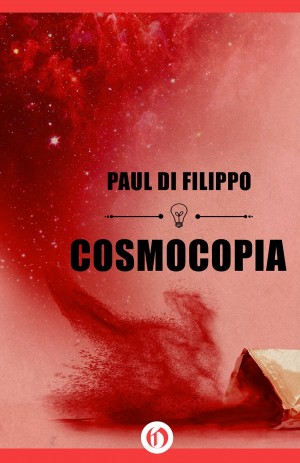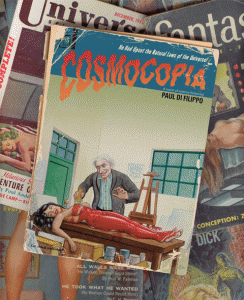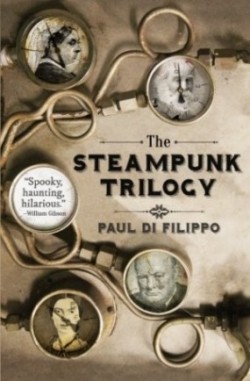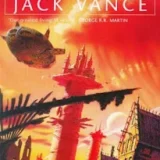Paul di Filippo is an author and reviewer living in Providence, RI. His first book, The Steampunk Trilogy, was one of the earliest uses of the term and helped bring it to reader’s attention and has recently been re-released by Open Road Media, which also published his most recent novel, Cosmocopia.
Steven H Silver for Amazing Stories: You were born, and still live, in Providence, which also produced H. P. Lovecraft. Do you feel that Lovecraft, or Providence in general, has had any sort of unique influence on your writing?
Paul di Filippo: Although a native Rhode Islander to the core, I was actually born in the state’s wild northern frontier, Woonsocket, a strange land of French-Canadian immigrant culture. I grew up in the towns of North Providence and Lincoln. As you might suspect, North Providence is adjacent to Providence proper, and I began riding the bus to the Big City circa 1965, while still in elementary school. What a different place Providence was then, much closer to what HPL would have recognized. I loved its squalor and decay and ancientness and non-hip traditions. Much of that, alas, is now vanished.
I moved finally to Providence as a young adult, in 1976. Coming up on the fortieth anniversary of that laudable decision! Having read Lovecraft’s stuff since high school, I wasted no time in tracking down actual venues featured in his fiction. The vibe of most of the East Side places was, and still is, intact. It is easily possible to picture the Old Gent strolling down these hoary streets. Consequently, he is never far from my thoughts when I am out and about on my daily errands. That spiritual and physical proximity has definitely seeped into my writing. The scale of New England, its mores and esthetics, are part of what I try to convey subliminally in many of my stories.
John Clute once semi-facetiously suggested that there was a school of New England SF writers, folks such as me, John Crowley, Liz Hand, Paul Park, Jim Kelly. I think there’s a nugget of truth to that!
ASM: How did you become interested in science fiction?
PdF: I have been reading fantastical works ever since I can remember. There was always something about fantastika that attracted me in ways realism could not. Even being read-aloud-to by my parents. pre-school, out of Dr. Seuss books counts. What better preparation for weird fiction than Seuss? By age five I had graduated to superhero comics. How I lamented the rise in price from ten cents per issue to twelve! Then came Tom Swift books. I count Raymond Jones’s THE YEAR WHEN STARDUST FELL as the first “adult” SF book I read, circa fifth grade. The discovery of Andre Norton was another big step. I got my subscription to F&SF in 1967. By then I was fully immersed in every possible SF book I could lay my hands on, from Dick and Ballard to Heinlein and Asimov and Clarke. I had two great teachers in high school who loved SF and with whom I could discuss it. It is possible for me to accurately say that there is no time I can remember when SF has not been part of my mental life.
ASM:The Steampunk Trilogy was original published in 1995, long before the Steampunk craze began, although well after its modern progenitors like Blaylock, Powers, Moorcock, and Jeter, were creating it. But you gave the subgenre its name with this book. Did you ever think it would grow into the phenomenon it is today? And in what formats do you think steampunk works best? Costuming, film, graphic novels, text-based, or something else?
PdF: I always make plain that although my book was the first to employ the neologism “steampunk” in its title, and hence contribute to a broader awareness of the term, the coinage still belongs exclusively to K. W. Jeter in his famous letter to LOCUS magazine.

Neither I nor anyone, circa 1990, could have predicted the immense and continuing popularity of this mode of storytelling. I’m still astonished by how steampunk resonated with the larger public. Part of its appeal lies of course in sheer escapism and daydreaming and fun adventures. But another part is that faux Victorianism or skewed Victorianism does offer a very useful lens through which to interpret our current 21st-century predicament. The roots of 2014 are firmly anchored in the nineteenth century, and only by probing at these roots can we understand the plant which flowered from them.
Steampunk fiction of course has become the mere tail on the dog. All the other aspects of the genre now dominate in terms of sheer numbers. It’s kind of like the way modern comics sell very few copies compared to tickets for superhero movies. But the comics serve as the “R&D labs” where new refinements arise and filter outward. This is the role of prose steampunk. I suppose the maker culture is the most visually and tactilely alluring, next to cosplay. The tangible aspect of invented rayguns and typewriter and jewelry is instantly appealing and needs no discursive apparatus to be appreciated.
ASM: Unlike many authors, your novels all stand on their own (although, of course, the stories in The Steampunk Trilogy have a thematic link) have you ever been tempted to write a sequel or a series?
PdF: The only time I’ve done so is with my two LINEAR CITY novellas, with maybe a third to come. I resist sequels because I always want to amuse myself with something new, and hopefully stretch my talents and abilities as well. But doing so comes with a cost, as other writers have noted. You do not develop a “brand.” Readers do not anticipate the next book you will predictably turn out in some series or other. They are continually baffled by your next production. It is only the accomplishment of a certain “voice” that encourages any fans to come along for the next ride. But even here I sabotage myself. The voice in my surreal erotic novel A MOUTHFUL OF TONGUES is very different from the voice in my gonzo transdimensional adventure FUZZY DICE. I guess all the facets of my oeuvre constitute one contradictory and idiosyncratic “vision,” and you have to hope readers appreciate that.
ASM: Your novel, Fuzzy Dice, had a rather unsympathetic protagonist. What are some of the unique issues that unsympathetic heroes raise and how do you deal with making them relatable to your audience?
PdF: Of course this topic has been getting a lot of press in mainstream literature lately, where certain female writers have objected to being asked to create nothing but “likable” characters. Lots of what these women writers have said in their defense is very good and insightful stuff, and can be easily found on the web.
I think it’s immensely challenging to make a protagonist who is not someone you would necessarily like to be best buddies with, and yet whose fate you become swept up in. But it’s always been part of literature. Just look at MACBETH, for one obvious instance. Even noble King Lear is kind of a jerk. If literature is the tool whereby we insert ourselves into the minds and lives of others, in order to gain entertainment and understanding, then no type of individual should be excluded from the roster of possible protagonists, because we want to understand all of humanity. You just have to make sure that your nasty anti-hero provides plenty of entertainment value as well as insights into the creepier realms of the human psyche. And villains have a way of doing very interesting things, albeit with bad outcomes for others.
ASM: How does writing science fiction differ from writing fantasy? How does reading science fiction differ from reading fantasy?
PdF: Writing SF of the truest, most useful and authentic sort has to be a game of “playing tennis with the net up,” to employ that famous metaphor which Greg Benford borrowed from Robert Frost (see Benford’s essay, “Real Science, Imaginary Worlds” which is available in PDF form online). The writer must adhere to logic and known science, must make sure all the parts of his speculative environment interact like a well-designed machine. The newly created scenarios must be as watertight as possible. And novelty is a very valuable feature too. Because real life is always changing and coming up with new aspects, so too must SF reflect this aspect of reality with fresh speculations.

Fantasy, on the other hand, is more primal and full of ancient archetypes, more subject to intuitive leaps of subliminal connections. It’s best to turn off the rationality when writing fantasy and go for the subconscious kick. Ghosts, for instance, are older than history, yet still appeal and can be employed in new tales for an effective frisson.
As a reader, one has to be in the proper mood for each type of fiction. You can’t approach SF with the mindset of M. R. James, or approach fantasy with the analytical hard-headedness of Jules Verne. It’s a matter of being in sympathy with what the creator intended. Or, to go back to the game metaphor, you can’t impose the rules of football on baseball, or vice versa.
ASM: In addition to writing your own works, you also write reviews. Do you apply the same critical reading to your own works as you do to the works you review?
PdF: My Prime Directive in writing reviews is to try to put myself in ultimate sympathy with the intentions and aspirations of the other writer. You cannot come to a review with a set of prejudices as to what you would do with similar themes and topics and tropes. You have to try to grok where the other writer was coming from, his or her foundations and intentions and goals. Only then can you begin to apply the objective standards of what constitutes good storytelling. Vividness, originality, depth of characterization, cleverness of plotting, etc.
I will say that extending this kind of objectivity and empathy to others has indeed led me to regard my own work from a kind of third-person perspective–after it’s finished. During the writing, you do have to become and stay fully immersed in your own peculiar vision. But afterwards, you have to regard your own work almost as if someone else wrote it. “What was this guy trying to achieve, and did he succeed?”
ASM: You clearly read a lot of science fiction and fantasy, both as a fan and a reviewer. What non-fiction do you read and how do you find the time for it?
PdF: Alas, my non-fiction reading time has shrunk and shrunk. Mostly nowadays it consists of the popular science magazines. If I am embarked on a particular project, I pick up the non-fiction work associated with that project. For instance, I just read A MAN OF MISCONCEPTIONS, about Athanasius Kircher, for a novel I want to write. But when it comes down to just grabbing an interesting title and reading for pleasure, I can’t find a niche for that anymore. Very sad. Some days I dream of retiring from writing and becoming once again a “mere” reader. But I don’t suspect finances or ambition will allow that to happen soon!
ASM: Describe the process for coming up with articles for the Plummage from Pegasus series.
PdF: This is the easiest process to describe: you look at the multiplex insanity and foolishness all around you, close your eyes, thrust out a finger, and whatever you touch becomes the next column! I could write one of these per day and never run out of topics. I am somewhat limited by the necessity of having the subject matter touch even tangentially upon literature, science, fandom, publishing, etc. For instance, it would be doubtful if I could get Gordon van Gelder at F&SF to run a column centering around, oh, excesses of the music industry or the fashion industry. There has to be a hook somewhere to the SF/F/H worldview.
Some of my earliest writing was columns just like this for my high school newspaper, and so I feel it’s kind of my default mode, something I fall back on when I am casting about for the next big fiction project.
ASM: Many science fiction novels, including your novella The Year in the Linear City create worlds which don’t seem capable of existing physically. What do these places offer the author that more terrestrial locations can’t provide?
Much of SF is dedicated to what I call “the reification of metaphor.” You can do the same thing in fantasy: take a metaphysical construct and imagine what would happen if it were real. Disch’s “Descending,” about an endless down escalator, is an example. But with the SF version you try to rationalize it, at least somewhat. The virtues of this type of story is that you explore deep-seated archetypes in a somewhat realistic fashion, luring the reader into a scenario he might otherwise reject as too outlandish.
ASM: Is Frank Lazorg, the protagonist of Cosmocopia, based on any specific artist?
PdF: Of course! Two guys hybridized! Frank (Frazetta) and Richard Powers, who often signed his paintings “Lazorg.” Both brilliant creators.
ASM: Publishing is currently going through a generational change with the advent of e-publishing and self-publishing and recently there seems to be an antagonism between the self-published and the traditionally published. How do you see this all playing out in the future?
PdF: I note that sales of e-books have levelled off, which seems to me to indicate an eternal interest in hardcopy. Now, that hardcopy could either be traditionally published, or self-published, of course. So, first, I believe we will always have a roughly 50-50 split between bits and atoms. I also believe that much of what traditional publishers offer–in-house editing, publicity, and distribution–will continue to be valuable assets. I for one simply cannot rationalize devoting hours and hours to typesetting, designing cover art, and running publicity campaigns for my own stuff. Every minute I’m not writing is wasted. But of course, do I earn as much when I let a big publisher take my work? Maybe not. But if I earn enough to live on, and don’t have to worry about doing the non-writing tasks, isn’t that a good deal of its type–at least for someone of my disposition?
ASM: With the amount of new science fiction being published today, what is the place of classic science fiction in the genre?
PdF: Well, let’s analyze that question by making it refer to mainstream fiction. Does the appearance of, say, Karen Russell invalidate reading William Faulkner? Does a new book by Richard Powers mean I have no room in my life for Charles Dickens? It seems ridiculous to assert that.
However, every single reader has a limited budget of money, time and attention. New works do crowd out older ones to some extent, simply because the living authors are in our faces all the time. If you don’t look for the classics, you won’t necessarily just stumble across them. It’s entirely possible to remain historically ignorant and be happy, I guess. But if you have any kind of desire to see the roots of what you’re currently enjoying, you need to look backwards. Maybe you’ll appreciate Patrick Rothfuss better if you read E. R. Eddison. It’s worth a shot!
Of course, the canon is always changing, and authors drop off the list, while others come on board.
ASM: Getting back to H.P. Lovecraft, there is currently a petition to redesign the World Fantasy Award, which is a representation of him. Would you care to comment on that?
PdF: I’m of the “no human representation” school. Make it some symbolic sculpture and solve everything that way.
Now of course, if they wanted to make it a bust of me, that’s another matter entirely!
ASM: Which of your novels and which of your short stories would you recommend to someone who has not read Paul di Filippo?
PdF: Luckily, I have a handy answer to that. Wildside is going to release soon one of their cheap MEGAPACKS containing twenty of my stories, old and new. The perfect sampler! As for a novel, because they are all so different, it’s hard to pick one. I am awfully fond of A YEAR IN THE LINEAR CITY, however!
Visit Paul on his website…and find his books at OPen Road Media










